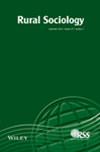妇女对气候不安全和暴力的脆弱性:来自孟加拉国的家庭层面证据
IF 1.9
3区 社会学
Q2 SOCIOLOGY
引用次数: 0
摘要
本研究调查了气候与安全关系中经常被忽视的人际冲突,重点关注气候影响如何加剧孟加拉国哈蒂亚岛妇女的安全风险。虽然气候安全文献通常研究群体层面的冲突,如农民和牧民之间或种族群体之间的冲突,但本研究将重点转移到家庭内部和家庭内部的动态,探索女性与配偶、家庭成员和邻居之间的冲突。通过生活史访谈,该研究揭示了在农村父权社会背景下,气候脆弱性、经济困难和根深蒂固的性别规范如何加剧紧张局势,导致家庭内部和邻居妇女之间的冲突。研究结果表明,气候引起的经济挑战加剧了国内紧张局势,而海岸侵蚀和资源退化导致的土地稀缺加剧了邻国妇女之间的纠纷。该报告强调要解决根深蒂固的社会规范和制度化的性别不平等问题,这些问题加剧了孟加拉国等保守社会和全球南方大部分地区妇女对气候影响的脆弱性,以保护她们免受暴力侵害。本文章由计算机程序翻译,如有差异,请以英文原文为准。
Women's Vulnerabilities to Climate Insecurity and Violence: Household‐Level Evidence From Bangladesh
This study investigates the often‐overlooked interpersonal conflicts within the climate and security nexus, focusing on how climate impact exacerbates women's security risks on Hatiya Island, Bangladesh. While climate security literature typically examines group‐level conflicts, such as between farmers and pastoralists or between ethnic groups, this study shifts the focus to intra‐ and inter‐household dynamics, exploring conflicts experienced by women with spouses, family members, and neighbors. Using life history interviews, the study reveals how climate vulnerabilities, economic hardship, and entrenched gender norms heighten tensions, leading to conflicts both within households and among neighboring women in a rural patriarchal social context. The findings suggest that climate‐induced economic challenges intensify domestic tensions while land scarcity from coastal erosion and resource degradation fuels disputes among neighboring women. The paper underscores addressing the deep‐rooted social norms and institutionalized gender inequalities that deepen women's vulnerabilities to climate impacts in conservative societies like those found in Bangladesh and across large parts of the global South to protect them from violence.
求助全文
通过发布文献求助,成功后即可免费获取论文全文。
去求助
来源期刊

RURAL SOCIOLOGY
SOCIOLOGY-
CiteScore
4.60
自引率
13.00%
发文量
47
期刊介绍:
A forum for cutting-edge research, Rural Sociology explores sociological and interdisciplinary approaches to emerging social issues and new approaches to recurring social issues affecting rural people and places. The journal is particularly interested in advancing sociological theory and welcomes the use of a wide range of social science methodologies. Manuscripts that use a sociological perspective to address the effects of local and global systems on rural people and places, rural community revitalization, rural demographic changes, rural poverty, natural resource allocations, the environment, food and agricultural systems, and related topics from all regions of the world are welcome. Rural Sociology also accepts papers that significantly advance the measurement of key sociological concepts or provide well-documented critical analysis of one or more theories as these measures and analyses are related to rural sociology.
 求助内容:
求助内容: 应助结果提醒方式:
应助结果提醒方式:


